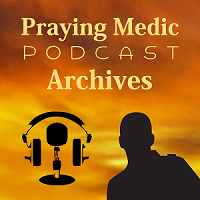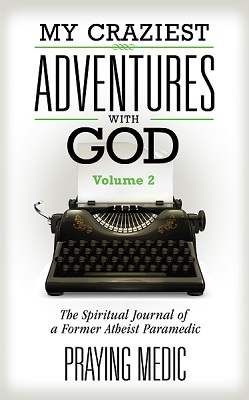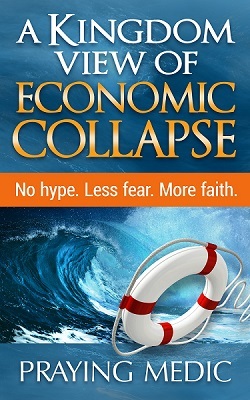Praying Medic's Blog, page 107
July 27, 2015
Podcast 022: Seeing in the Spirit
To open in a new window click this link: podcast 022
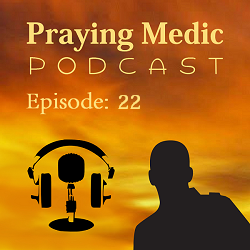
This is a conversation I had with my friend Tosha Marks. We talked about the ways in which she has been growing, spiritually and the development of her ability to see in the spirit. We talk about traveling into the heavens and visiting the courts of heaven and share our thoughts on how God is preparing believers for a world that seems to be growing darker. We discuss the different ways in which God speaks to us and talk about the gift of prophecy. We wrap up with a discussion about healing people in dreams.
Listen or Subscribe
Resources Mentioned
Seeing in the Spirit Made Simple
A Kingdom View of Economic Collapse
Mike Parsons Supernatural Mentoring
Past Episodes
July 25, 2015
Reiki Master Meets Jesus
This is the testimony of a Reiki master who met Torben Søndergaard and through him—encountered the power and love of Jesus.
July 22, 2015
The Watchman on the Wall

total word count: 657
The watchman on the wall is a venerated archetype of the prophetic servant who stands guard at a distance from his community in order that he might detect the approach of trouble and warn the village. It’s a romantic stereotype that many of us have embraced, but it may not be the best model for ministry. And if we choose to live this way it may actually do us more harm than good. One problem with this model is that it suggests that the prophet ought to remain at a distance from his village, for the sake of both the prophet and the village.
I’ve come to know prophets who have found themselves isolated from fellowship with other believers. The usual explanation is that others have shunned the truths they speak in favor of believing lies. Many prophets truly believe that it’s only their revelation that has caused them to be rejected, and not their presumption, their pride or their need to control others. So they live as outcasts of God’s household, in the manner legend says men of God did long ago—as watchmen on the walls at the edges of their communities.
If a prophet is to have an effective ministry, it’s not enough to merely speak what God reveals. The prophet’s audience must also receive and act upon his words, otherwise his ministry bears no fruit.
In the past, I’ve felt it was enough to speak what God revealed without compromising the message. If people ignored the message, I thought, it wasn’t the prophet’s problem. There is some truth to this idea, because people must have ears to hear the message and you can’t force anyone to receive revelation.
But lately, I’ve come to realize that the harder part of prophetic ministry is developing relationships within a community where people are willing to listen to us. If a group is initially resistant to a prophet’s message, he can help them become more receptive. But that takes time, and it requires trust. And it’s not an easy task—especially if the prophet views the community as being sinful. Living with and loving sinners requires a higher level of spiritual maturity.
The other thing we ought to consider is the possibility that the prophet has been emotionally wounded by rejection. I don’t know anyone (myself included) who hasn’t been wounded by rejection. It might seem like a cross we need to carry, but the Bible says Jesus bore our griefs and sorrows on the cross. And if He bore them for us, there’s no reason for us to carry them any longer. He paid the price to bear our emotional trauma and we need to let Him heal our emotional wounds. Emotional healing allows us to live in peace with others.
I wonder if it’s possible to be a watchman in the home, or a watchman in the university, or even a watchman in the workplace. I wonder if God could use us to watch for danger where our influence is organic and our message is more likely to be received and acted upon. If, as John Maxwell says, leadership is a matter of influence, then maybe there’s room for watchmen in places other than out in the cold at the edges of civilization, where no one can hear them.
Jesus was the quintessential prophet. His message was received by sinners more warmly than by any other group. They loved Him, they heard His message and they acted upon it, because they knew how much He loved them. The love of God caused them to repent. And His love was not just a matter of words, as is true for many of us today. It was demonstrated by acts of service. If a prophet is going to be used by the Lord in a community, he must make himself (or herself) a part of that community. That requires a heart that loves and serves others right where they are at—sin and all.
July 20, 2015
Podcast 021: Sarah’s Story – The Testimony of a Former Lesbian
To open in a new window click this link: podcast 021
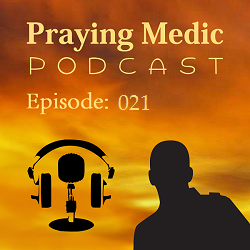
This is the testimony of Sarah, a woman who had always been attracted to other women. She explains how the Holy Spirit gradually changed her heart and how Jesus visited her in dreams—all of which allowed her to leave behind the lesbian lifestyle.
Listen or Subscribe:
Past Episodes
July 18, 2015
My Craziest Adventures With God – Volume 2
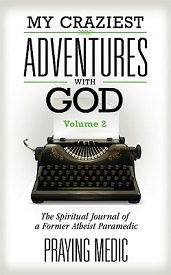 My Craziest Adventures With God – Volume 2 is now available on Kindle. Here’s an excerpt:
My Craziest Adventures With God – Volume 2 is now available on Kindle. Here’s an excerpt:
While arriving at a hospital with a patient, I noticed a nurse who was limping down the hallway with an immobilizer on her foot. As we passed in the hallway, I told her I wanted to have a word with her after we dropped off our patient. After we got our patient settled in into his room, I went hunting for the nurse. It didn’t take long to find her. “Do you mind if I ask why you have the immobilizer?”
“I tore my Achilles tendon and now I have permanent foot drop,” She replied. “The immobilizer lets me walk without dragging my foot on the floor.”
“What the heck are you doing at work with that kind of injury, shouldn’t you be at home?”
“I don’t have any paid time off left.”
“I see. Well how would you like to be healed?”
She gave me a funny look. “What do you mean healed? Do you use some kind of energy healing?”
“Not exactly,” I said. “I pray with people and God heals them.” That brought a smile to her face.
“I believe in God and I know He heals people.” She agreed to let me pray.
I crouched down and put my hand on the immobilizer. “I command this tendon to reattach to the bone right now, in the name of Jesus. Pain and inflammation, leave. Spirit of pain, get out right now!” I asked what she felt.
“It kinda tingles all around my foot.”
“Well, that’s because God is healing you. Why don’t you take the immobilizer off and try walking on it?”
“I can’t. If I take it off, I’ll get yelled at.”
She’d seen a specialist who said there was nothing that could be done. She came to work, but had to wear the immobilizer. If a supervisor saw her walking without it, she’d have to explain why. So it was easier for her to leave it on. I encouraged her to trust that she was healed and take it off when she got home.
While all this was happening, a small crowd of nurses had gathered in the hallway. They were curious to know more about how I did this healing, so I shared a few testimonies with them. One woman asked if I used some kind of energy healing.
“Nope. It’s all Jesus.”
They wanted to know my name and how to contact me. I ran out of business cards, so I wrote my contact information on paper towels. One of the people who saw me praying for the nurse was my new EMT partner. A few days later, at the end of our shift, he brought up the nurse and the healing encounter and asked how I got started in healing. I shared a few healing stories and told him about the many dreams I’d had about healing. “Do most of the people you pray with stay healed, or do their symptoms return?” He asked.
“Most people stay healed, though some have their symptoms return.”
“Do you think I could be healed?”
“Absolutely. What’s bothering you?”
“Neck pain. I’ve had it for about three weeks, mostly when I turn my head to the right.”
“Do you want to be healed?”
“That would be awesome.”
I put my hand on his neck. “Pain, I command you to leave right now in the name of Jesus.” I had my eyes closed and saw a faint suggestion of flames. That gave me the impression that God would bring heat to his neck so I went with it. “Lord, increase your heat.” I asked what he felt.
“My neck feels pretty warm.”
He turned his head left, then right and his mouth dropped open. “That’s totally crazy! I can move my head and it doesn’t hurt! It’s gone!”
We celebrated his miracle. I told Him that God is always looking for people to heal because He loves us so much. The next day we were back at the same hospital. We ran into the nurse I prayed with the day before. She was still wearing the immobilizer.
“How’s your foot doing?” I asked.
“It feels great. From the time you prayed for me, there hasn’t been any pain.” She pointed to the foot immobilizer. “I still have to wear this thing at work so I don’t get in trouble, but I have an appointment with my doctor in a few days. I can’t wait to hear what he says!”
A co-worker sitting next to her asked if I was the guy she’d been talking about. Apparently there was a lot of talk about healing after I left. This woman wanted to know what type of healing I did. She practices Reiki. I told her my healing comes from Jesus. She was interested in hearing more, so I shared with her some of the things I’d seen God do.
“Would you pray for me? I have three bad heart valves and emphysema.”
“Of course I’ll pray for you.”
I knelt beside her. “Holy Spirit, bring your presence and touch this daughter of yours. Heart valves, I command you to be healed in the name of Jesus.” I asked if she felt any different.
“It’s the weirdest thing… I feel like there are butterflies in my heart. There’s this wonderful fluttering feeling. And I can see the color pink.”
Recently, I had been seeing the color pink, too. “Sometimes I see the color pink, especially when I’m praying and I say certain words, like “life,” “healing” and “power.” I see pink lights that glow brightly, which is how the Holy Spirit tells me that my words carry healing power.” Not only did she feel as if her heart was being healed, but she felt like she could breathe better. We talked about healing for another fifteen minutes. She hugged me and thanked me for praying with her. I told her I’d be back for a follow-up report.
God can connect you to people who need healing through a testimony. When one person is healed—and they testify about it—their testimony encourages others to find you, if they want to be healed.
For the Kindle version, click this link or the image below.
(The paperback version will be available in a few weeks.)
July 16, 2015
Wake Me Up When September Ends
total word count: 604
There are a lot of people talking about what’s coming in September. My wife had an interesting dream this morning that I wanted to share with you to illustrate a couple of points:
This was the only dream she can remember having in the last 4 years where the setting was our current house.
(Current house – current time-frame)
In the dream, a man came to our home early in the morning to tell us something about a flood. He had pictures of flooded homes and he wanted to show them to us.
(Was this fellow a prophet who came to deliver bad news?)
I came outside to hear what he had to say and after hearing some of his message I told him to leave (twice). Then my wife came out to see what was going on. She was annoyed because she had not had her coffee yet and this guy was interrupting her morning.
He had tables and chairs set up in front of our house and there were a lot of people sitting down listening to him.
(The man is speaking to people we know)
My wife listened to him and he rambled on and on but never did get around to telling us the point of his message. He just kept rambling.
(He comes to deliver a message, but has no specific details he can share.)
At this point my wife went back in the house and the dream ended.
Things to consider:
I’ve read a number of recent prophetic words which use the word “flood” symbolically. They speak about something “coming in like a flood” but few of these prophetic words have any specific details to share. Prophets are reporting “something” is going to happen, and many of these involve the time frame of the middle of September, but they tend to be sparse on details. (If you happen to have any revelation that includes details about what we might expect, you can leave the information in a comment below.)
God does not ask us to react to prophecy. He asks us to judge it (or discern it by the Spirit if you prefer.)
If a prophetic word is judged not to be of God; not to accurately represent His heart; or not to represent the truth of a matter, we are free to disregard it.
If a prophetic word is deemed to be from God; if it’s deemed to represent the truth of a matter; or if we believe God is revealing the enemy’s plan, we have a couple of options:
1) We can stand in agreement with the word and pray for it to come to pass.
2) We can stand against it and pray for the opposite to come to pass.
The twelve spies returned from the land with a mixed report. Ten of them had a negative view of their chances for victory. Two spies liked their odds. The report the Israelites chose to believe became
their destiny. Sometimes we’re given options and we get exactly what we believe to be true. We have a choice about what we choose to believe about September. If we come into agreement with a bad report, we may very well help in making it come to pass. But if we expect God to do something positive and pray in agreement with it, we could see some pretty cool changes.
I’m not saying that there aren’t some changes coming in September. The only constant in life is change. The only exception is God. As for me, I’m expecting changes—for the better. I’m going to keep advancing the kingdom that is always expanding its rule. It is after all, a kingdom that cannot be shaken. And I’m going to keep dreaming with God.
Be sure to wake me up when September ends.

July 15, 2015
Prophetic Writing
total word count: 344
One of the benefits of being a believer is that we have the ability to communicate directly with God. We can speak to Him and He speaks to us—more often and in more ways than we sometimes realize. There’s another benefit of being a believer that we may want to use more often. We have the ability to receive information from Him while simultaneously communicating that revelation to others. An example is the gift of tongues.
When we speak in tongues, our speech is inspired by the Holy Spirit. We speak what the Spirit wants us to speak, bypassing our own thought processes. The inspired speech is spoken in a language we don’t (usually) understand. When believers learn to speak in tongues, they often report that it helps to simply open their mouth and begin speaking, while anticipating (an exercise of faith) that God will fill their mouth with his words.
A similar process is used when we prophesy. When people learn to prophesy (as with tongues) they often report that the flow of revelation comes when they begin speaking—anticipating that God will inspire their words.
But what about writing?
I’ve learned over the last few years that the exact same thing can happen with writing. I often find that as I sit at my writing desk, if I anticipate that the Holy Spirit will give me something to write, He does. I receive thought and visual impressions in my mind and I simply write the impressions as I receive them. Now I’m not for a minute suggesting that the writings of a person operating under the inspiration of the Spirit today carry the same kind of authority the writers of the scriptures had. They do not. But the process used is similar, even if the level of authority is not the same.
Receiving inspiration from the Holy Spirit is not as spooky or weird as some people would have you believe. It’s actually a very natural process and as you practice, you’ll find that you’ll become more sensitive to what the Spirit is saying.

July 13, 2015
Podcast 020: Matt Hallock – Fighting the Good Fight
To open in a new window click this link: podcast 020

My guest today is Matt Hallock. (His wife Cory sat in on the conversation.) Earlier this year I announced that I was going to publish a book on hearing God’s voice and I asked people to submit their essays to be published in the book. Matt sent a submission that was very good. I learned that he needs healing for an autoimmune disease he’s had for 8 years. (We had a prayer session that was not included in this interview, for privacy reasons.) Matt has recently begun looking for opportunities to pray with people for healing, and he’s blogging his stories, despite the fact that he suffers from a severe illness himself.
To encourage Matt to keep fighting the good fight, I shared my wife’s testimony of healing. We discuss the compilation book on hearing God’s voice and the process the contributors will go through to get the book completed. Matt told me about his business as a tutor and shared the concerns he has about ministering to people through his business. To close the show, I shared a testimony of how God showed me favor in the workplace.
Listen or Subscribe:
Resources
Matt’s tutoring business can be found here: Matt Hallock Tutoring
Matt’s blog can be found here.
Past Episodes
July 9, 2015
A Kingdom View of Economic Collapse
This is an excerpt from my latest book, A Kingdom View of Economic Collapse.
On June 30th, 2015, after years of financial trouble, Greece failed to make a required payment to the International Monetary Fund and entered into a default on its sovereign debt. In light of Greece’s default and due to the proliferation of books predicting catastrophic judgments upon America (and the rest of the world) it seemed good to share what I’ve learned about economic collapse and how the kingdom of God responds to crisis.
You don’t need to look very far to find dire warnings of disaster being spoken by secular experts and religious leaders. Many financial experts have written books citing the reasons why they believe an economic collapse is approaching. At the same time, many religious leaders have shared prophetic warnings that we’re entering a time a great difficulty; some are predicting that the end of the world is at hand.
While I believe that some financial experts have given us an accurate assessment of the problems we face, what they lack is a divine perspective on the problem. And while religious leaders have good intentions, what they lack is an understanding of how financial systems work. What is most concerning is that neither camp has put forth a clear plan to help us survive such a crisis, much less rebuild in its aftermath.
The approach financial advisers generally take is to sign you up for their investing programs. They warn that your retirement savings are about to be wiped out and that if you pay them a fee, they’ll tell you where to invest your money. The main reason why many church leaders don’t offer a plan to survive or rebuild after a global crisis is that they don’t expect to be here. The popularity of the belief that the church will be taken into heaven in the rapture before a global crisis hits has prompted many theologians to abandon all thought of what the church’s responsibility might be in a post-crisis world.
After becoming a believer, I sat in a church pew and read my Bible. I learned all the reasons why the Great Tribulation was approaching, why the Antichrist was ready to be revealed, why the world was teetering on the brink of catastrophe, and most importantly, why we believers wouldn’t be around for all of that. Although I was told that God’s wrath was about to be poured out upon the earth, I was also assured that my King was going to appear and rescue me from it. During this time, I never witnessed a creative miracle and never saw anyone healed or set free of a demon. And although I learned a lot about the institution we call the church, I learned virtually nothing about what Jesus called the kingdom of God.
Then one night I had a dream. In the dream, I met God, and He had a few things He wanted to share with me. He said He wanted me to heal the sick, cast out demons, raise the dead and proclaim His kingdom.
The nerve of Him.
If He weren’t the Almighty, I might have given Him a piece of my mind. He spoke not a word about waiting for the rapture and nothing about witnessing to sinners or handing out tracts—things my pastor told me were top priorities. Since that day, I’ve had hundreds (perhaps thousands) more dreams and the subject hasn’t changed. Few, if any of them have portrayed the end of the world, the rise of a one-world government or world-ending disasters. Nearly all of them have to do with battling the kingdom of darkness, setting captives free, and using my time and energy to advance His kingdom.
I think we should ask a few questions of those who predict catastrophic events that are claimed to be judgment from an angry God:
What if the coming events are not actually the result of God’s wrath, but instead, the natural outworking of our own poor choices, or those of our elected leaders?
What if a global crisis strikes and the church is not removed from the earth beforehand?
Is your pastor teaching you what to do if the church survives a global catastrophe, or are all your hopes pinned on Jesus rescuing you from it?
It’s certainly more pleasant to think that we won’t be here when things get ugly, but we have no guarantee of that. And if we are destined to remain here, wouldn’t we be wise to spend a little time preparing, at least mentally, if not physically?
I don’t see any reason for us to fear the future. Whatever is coming, God can make us aware of it, and if He can make us aware of it, He can prepare us for it. I would encourage you to rest in the knowledge that God has a plan that He is working out in these events. If you’re positioned in Him, and prepared mentally for the challenges that lie ahead, you may find all of this to be a liberating experience, and not a terrifying one.
My intent with this book is to examine the topic of economic collapse from various perspectives. The book can be divided roughly into five sections: The first is a course on economics and finance. My goal with this section is to describe (in terms the average person can understand) how the financial systems of the world operate. In the second section, we’ll look at historic cases of economic collapse and the things that caused it. We’ll also identify which nations are at risk of experiencing economic collapse today. In the third section, we’ll look at the Greek debt crisis and I’ll offer a few observations on how we can avoid the same fate. In the fourth section I’ll share the dreams I’ve had that give a prophetic overview of the days ahead and I’ll discuss what I believe to be God’s purpose for these events. In the last section, we’ll look at how the kingdom of God ought to respond to crisis.
A Kingdom View of Economic Collapse is available only as an e-book. It can be found by clicking on this link or by clicking on the image below.
July 8, 2015
Beware the Evil Eye – Rob Coscia
total word count: 357
My guest blogger today is Rob Coscia

I’ve been reading the Gospel of Mark over and over for a long time, but recently, I was struck by something Jesus said in Chapter 7, like I’d never read it before: “And He said, ‘What comes out of a man, that defiles a man. For from within, out of the heart of men, comes…an evil eye.” (Mark 7.20-21).
There’s a whole bunch of nasty things listed there that come out of a dark heart, but I got stuck on “evil eye”, mostly because it sounds like something from a Mel Brooks movie. Most other versions translate “evil eye” as “envy”, but the word “covet” is already there in the list. Literally, the words translates to “diseased vision” or “wicked sight”.
What hit me most about this is that it’s not just an evil thought like “deceit” or a destructive state like “pride”. This is more. It’s a mindset, a philosophy of life. It’s seeing as the enemy sees, instead of as God does. It’s agreeing with darkness. It looks for everything wrong in others, for how hard everything will be, how unfair life is. It judges people and circumstances by what has gone wrong in the past, and isolates you to keep you from getting hurt again. It boils life down to a principle that can be measured and controlled, instead of letting it grow in relationship that is living and unpredictable.
What’s my point? Well, as Mel Brooks said, “You got to be brave. If you feel something, you’ve really got to risk it” (Then again, he also said “Spaceballs: the flame thrower! The kids love this one”). Ask God to change the way you see life. Ask Him to transform your heart to be like His. Jesus called the religious leaders blind, because they chose to only see fear and darkness. That’s not you. You are bold, adventurous, joyful, compassionate, merciful, peaceful, powerful, and positive.
“What do you want me to do for you?” Jesus asked him.
The blind man said, “Rabbi, I want to see.”
“Go,” said Jesus, “your faith has healed you.” Immediately he received his sight and followed Jesus along the road.
(Mark 10)





